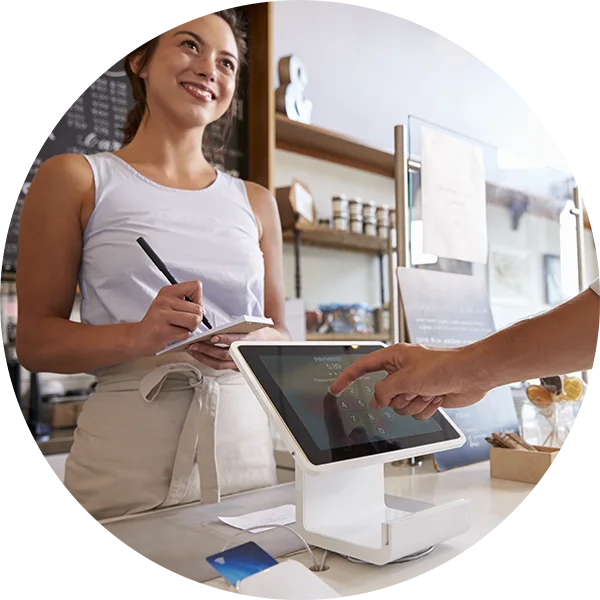The Importance of Technology in Small Business

Small businesses play a pivotal role in shaping local economies, and technology plays an equally vital role in shaping small businesses. Today, it’s no longer a question of whether a small business should embrace technology; it’s a matter of how they can effectively do so to reap the benefits.
In this blog, we’ll delve into the transformative role of technology in small businesses and how the integration of on-premise media solutions can serve as a catalyst for motivating customer behavior and boosting overall business success.
Technology in Small Business
In today’s fast-paced business landscape, technology has evolved from being a mere luxury to a necessity for small businesses. These enterprises, often characterized by their agility and personalized services, must leverage technology to remain competitive and meet the ever-evolving demands of modern consumers.
The strategic use of technology not only enhances efficiency but also plays a pivotal role in motivating customer behavior, a vital aspect of driving sales and fostering customer loyalty. Small businesses that harness the power of the right on-premise media solutions, such as digital signage, in-store music, and scent offerings, have the unique opportunity to create an engaging and immersive environment that not only captures customers’ attention but also motivates them to explore, connect, and make purchases.
Small businesses now are able to access a range of technologies that were once only available to larger enterprises. Technology has made it possible for small businesses to streamline their operations, improve their products and services, motivate customer behavior, reduce costs, and increase productivity, among other benefits.
Benefits of Using Technology in Small Business
The benefits of technology in small businesses extend far beyond operational efficiency. Embracing the right technology solutions can motivate customer behavior, change perceptions, build loyalty, and ultimately drive business results.
By harnessing data analytics and customer insights, small businesses can personalize their interactions, creating tailored experiences that motivate customers to explore and engage. Technology also provides tools to change perceptions – from traditional to innovative, from outdated to cutting-edge – enabling businesses to present themselves in ways that resonate with today’s tech-savvy consumers. This, in turn, builds loyalty as customers appreciate the convenience, personalization, and consistent experiences that technology enables.
As a result, small businesses witness tangible results, from increased sales to a growing customer base, making technology an indispensable asset for thriving in the digital age.
Technology is no longer an option for small businesses; it’s a necessity. Today’s consumers demand a new and engaging shopping experience – one that allows them to learn, discover, and explore. This new style of shopping creates a need for businesses to bridge the gap between the physical and digital worlds in order to deliver a satisfying customer experience.

Technology Trends in Small Business
Phygital Revolution
One of the most prominent technology trends in small businesses is the rise of the “phygital” approach. This concept fuses the physical and digital worlds into a seamless customer experience. Small businesses have embraced this trend by integrating their online and in-store operations, creating a unified presence across multiple channels.
Customers now expect the convenience of browsing online and the tactile experience of in-person shopping to coexist harmoniously. By adopting phygital strategies, small businesses bridge the gap between these two realms, ensuring a consistent and engaging experience.
Omnichannel Strategies
In the digital age, small businesses are realizing the importance of adopting omnichannel strategies. These strategies provide customers with a seamless shopping experience across various channels, such as physical stores, e-commerce websites, mobile apps, and social media. This approach ensures that customers can interact with the business in multiple ways, providing convenience and enhancing their overall experience.
For example, a small boutique can allow customers to browse products online, order through a mobile app, and pick up items in-store. Omnichannel strategies not only motivate customer behavior but also boost loyalty and engagement. Small businesses are increasingly leveraging technology to implement these strategies, with the goal of delivering a consistent and satisfying experience to their customers, regardless of how they choose to shop.
Technologies Every Small Business Needs
Small businesses can no longer rely on a single channel to engage with customers. Consumers today expect to interact with businesses in various ways, often simultaneously. To provide this level of convenience and engagement, small businesses need technology solutions that connect these different channels seamlessly.

Digital Signage
Digital signage is a versatile technology that small businesses can employ to enhance their physical locations. It involves the use of digital displays to showcase dynamic content, such as advertisements, promotions, product information, and even entertainment. Small businesses can use digital signage to grab the attention of customers, deliver real-time updates, and create an engaging shopping environment.
Imagine a small boutique using digital signage to display rotating images of their latest fashion arrivals or promote ongoing sales. The ability to quickly and easily update content ensures that customers are always informed about what’s happening in the store. This enhances the overall shopping experience and motivates customer behavior, such as making a purchase.

In-Store Music for Business
Music plays a significant role in setting the mood and atmosphere of a small business. The right background music can create a pleasant ambiance, make customers feel at ease, and even influence their purchasing decisions. In the digital age, small businesses can take advantage of customized music for business solutions.
By curating programs that resonate with their brand and target audience, small businesses can set the perfect sonic backdrop for their stores. Whether it’s a coffee shop playing soothing tunes to create a relaxed atmosphere or a boutique using upbeat music to energize shoppers, in-store music has the power to significantly impact the customer experience.

In-Store Audio Messaging
In addition to music, in-store audio messaging is another technology that small businesses should consider. This solution allows businesses to deliver personalized audio messages to customers in real time. These messages can include greetings, promotions, information about products, and more.
For example, a small bakery might use in-store audio messaging to greet customers with a warm “Good morning!” and inform them about the daily special. This technology not only engages customers but also adds a personal touch to the shopping experience, making customers feel valued and appreciated.
In-Store Ad Networks
In-store digital advertising is an effective way for small businesses to promote their products and services. In-store ad networks enable businesses to display advertisements on digital screens within their physical locations. These advertisements can be dynamic and eye-catching, providing a platform for businesses to showcase their offerings. Customers can easily see these promotions at critical moments in the shopping journey, making it more likely that they’ll make a purchase.

Scent Solutions
Scent is a powerful yet often overlooked aspect of the shopping experience. The right scent can evoke emotions, create a memorable atmosphere, and even influence buying decisions. Small businesses can utilize scent solutions to enhance the ambiance in their stores and leave a lasting impression on customers.
For example, a spa or wellness center might use scent solutions to infuse the air with calming aromas, contributing to a sense of relaxation and tranquility. Scent marketing can enhance the overall customer experience and reinforce the brand’s identity.

What Challenges Has Technology Created in Small Businesses?
Though the use of technology is essential, it is not always smooth sailing. The rapid integration of technology in small businesses has ushered in several challenges that owners and entrepreneurs must navigate. These challenges include:
Data Security Concerns: Small businesses often handle sensitive customer information. As they embrace technology, data security and privacy concerns become paramount. Safeguarding this data from cyber threats and ensuring compliance with data protection regulations is a significant challenge.
Skills Shortage: The digital age demands a skilled workforce capable of managing and harnessing technology. Small businesses may struggle to find and retain personnel with the right technology skills, leading to a skills shortage.
Adaptation to Rapid Changes: The technology landscape evolves quickly, with new trends and innovations emerging regularly. Small businesses must keep pace with these changes to remain competitive, which can be challenging given their often limited resources and time constraints.
As small businesses strive to leverage technology to enhance their operations and engage customers, they must address these challenges proactively. This involves finding innovative solutions, investing wisely, and staying informed about the latest developments in the tech landscape. Ultimately, the benefits of using technology far outweigh the challenges, empowering small businesses to thrive in the digital age.
What Are Businesses Lacking in Technology?
Small businesses often find themselves facing technology gaps due to various constraints. Here are some key areas where businesses may be lacking in technology:
Data Utilization: While collecting customer data is crucial, small businesses often lack the tools and expertise to effectively utilize this information. They may miss out on opportunities for personalized marketing, customer insights, and process optimization. Harnessing the power of data analytics and customer relationship management (CRM) systems is an area where many businesses have room for improvement.
Cybersecurity Measures: With the increasing threat of cyberattacks, small businesses frequently lack robust cybersecurity measures. This vulnerability can put them at risk of data breaches and financial losses. Implementing strong security protocols, including firewalls, encryption, and employee training, is often an area where businesses need to strengthen their defenses.
Integrated Technology Solutions: Small businesses might use a patchwork of disparate software and applications that don’t integrate well. This lack of integration can lead to inefficiencies, data silos, and difficulties in managing day-to-day operations. Implementing integrated technology solutions can streamline processes and improve overall efficiency.
In recognizing these technology gaps, small businesses can strategically invest in solutions that address these shortcomings, allowing them to enhance their operations, connect with customers, and thrive in an increasingly digital world.
The Right On-Premise Technology for Your Business
Collaborating with an on-premise digital media provider can be a transformative step for small businesses grappling with the complexities of technology. In the modern marketplace, offering an omnichannel experience is vital, but it often presents challenges for smaller enterprises. On-premise digital media providers specialize in crafting unified, technology-driven solutions that seamlessly integrate online and in-store channels. They bring not only cutting-edge technology, such as digital signage, in-store music, and scent solutions but also the expertise to ensure these technologies work harmoniously to create a cohesive brand presence.
This partnership empowers small businesses to bridge the gap between physical and digital realms, enabling them to engage customers in a consistent and engaging manner across various touchpoints. On-premise digital media providers like Mood Media simplify the management of these technologies, making it easier for small businesses to navigate the intricacies of the digital age. With these integrated solutions, small businesses can overcome the complications associated with technology and provide customers with a truly seamless, omnichannel experience that enhances their operations and sets them on a path to thrive in the digital age.
